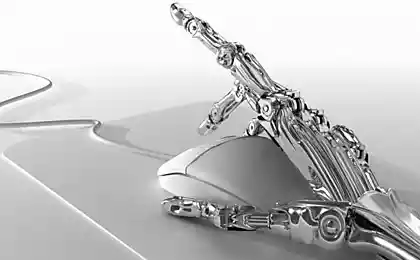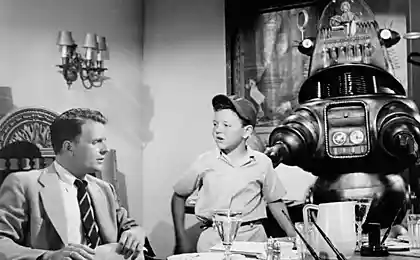520
What makes a woman strong? and other questions on filling of the professors of Cambridge and Oxford
The publishing house "MYTH" the book "tricky Question" — a collection of the most common puzzles used in interviews at Oxford and Cambridge. It is known popularizer of science John Farndon offered their own answers to questions like "What happens if you drop an ant?" or "Why do people have two eyes?". Their examples Farndon explains how to force yourself to think, to change your mind and to confuse knowledge with imagination.

© Putput
Imagine that we don't have any information about the past, in addition to all those associated with the sport. How much could we learn about history?
The question is asked for admission to the Faculty of history in Oxford
I would hazard a guess that such a strange coincidence happened, because all other archival data mysteriously disappeared, that is the explanation for not including that this is the only recording ever done by the people. In the latter case, we can conclude that our ancestors were just obsessed with sports. of course, information about sports, Dating back to before the last century and a half, rather scarce. In General documented much more important phenomenon. So my answer to the question is based on the hypothetical assumption that we have a much larger volume of historical documents about sports than actually. In the text of the question reads all the data "associated with the sport", but I guess we should limit ourselves to discussing only information directly concerning the sport, and not just indirectly related to the subject, because otherwise the amount of information available to us is quite large.
Most of the historical research connected with the recovery of the big picture from the smallest elements. Specialists in ancient history can draw conclusions about the development of trade and international relations of the fragments of amphora (ancient wine jug). Therefore, it is likely that the ability to determine which parts are relevant and which are not, will shed light even in the very distant past. For example, if we have in stock will be a complete list of participants of the Olympic games and honorable guest, we will be able to glean a lot of information about prevailing at that time international relations. The list of dishes is able to give us an idea of the food of the people of that time, and the origin of ingredients is on trade relations.
It may seem that we can regain a grain of the vast knowledge we possess about those times. But if the record of the sports events will be informative enough, we will probably be able to collect very detailed information about racial, tribal and gender of the participants and spectators of the competitions. Also, in my opinion, we easily determine the dates of the reign of the emperors, because they acted as patrons of many competitions, from Gladiator battles to chariot racing. Change the venue of the games indicate changes in the life of the Empire and the existence of such bloodthirsty entertainment like Gladiator fights, throwing Christians to the lions, etc., says a lot about the peculiarities of Roman society. [...]
The wife asks the husband not to add the jam into the fried eggs at Breakfast, and he still continues to do so. Could this be the reason for the divorce? The question is asked for admission to the Faculty of jurisprudence in Cambridge
What a hilarious scene! I can see the suffering look well-groomed beauty, who is sitting at the table, sipping coffee from a Cup and looks at how her husband plops a spoon of jam into the eggs and then wipes his hands on his old stretched sweater. Classic plot for a sitcom on the BBC. Divorce is not the will, but the award for best comic series can. But, as ridiculous as may look this episode, very often it is these small differences make a marriage real torture. Every small event like this is often to pair a deep symbolic meaning.
In fact, it may well be that we see before us is not a sketch comic, and the tragic "Madame Bovary". For wife strange behavior of her husband can be a painful reminder of how she made a mistake in choosing a partner. And the fact that he can't hear her (quite reasonable) requests and does not abandon his eccentric habits, gives it a very heartless person. Fortunately, the days when a woman could not divorce a man, no matter how violent and aggressive he was, and even though the rape and beatings was not considered grounds for divorce, stayed in the past. The company recognized that some families fall apart and that two people should be able to separate not only physically but also legally.
Despite its absurdity, the question about eggs and jam shows us what a strange and ambiguous place in our law of procedure of dissolution of marriage. In most countries it requires the base. Despite the fact that the laws concerning divorce vary in different States, a spouse at any point of the world can't just say "I quit" and it legally terminate your marriage, although the emotional component of such statements is obvious to all parties in the process. [...]
So, marriage is a very strange contract. As said the canadian philosopher will Kymlicka, "there is no documentation in writing, each party waives his right to self-defense, the conditions may not be revised, none of the parties does not understand them completely, and besides, the contract cannot be added to third persons." To consider marriage as a contract, subject to termination only in the course of the trial, is not possible. It is a relic of the past, when the legal side of marriage really mattered, and the wife became the property of her husband. Fortunately, those days are long gone, and the marriage is now perceived as a mutual agreement between two consenting adults, freely expressing their will. The notion that divorce is something shameful and that one of the parties needs to prove his innocence, is also disappearing. Gone those days, when the couple thought it possible to defend in court his desire to keep the family together. So as the search for grounds for divorce is merely indicative of the formality, the essence of these mutual claims of the parties already very few people interested.
So, in fact, the disgust of the wife to the habit of the husband to add jam to the scrambled eggs can become a reason for divorce, what would no other people were thinking. Only the decision of the couple, not the court, should be taken into account. The fact that he generally plays some role in determining the grounds for divorce, it seems ludicrous. Only the spouses themselves can know for sure that their marriage came to an end. In other words, I believe that scrambled eggs with jam, or sausage with jam, or wiping greasy fingers on a sweater, or any other annoying habits of one of the partners must be accepted by the court as grounds for divorce. I'm not saying that these little things are worth to throw them a family, but for the court they should be sufficient. If it scrambled with jam was heard in court, it could be recognized as grounds for divorce, and could not be. To predict the verdict, you need to know a lot more about the relationship between the spouses. Something to consider my husband's behavior: annoying habit or an element of psychological violence? Personally, I would like to hear more of this story.
Why not open in the heart of Oxford Walmart? The question is asked for admission to the Faculty of Economics and management at Oxford
Walmart— hard giant and supergiant business. Today it is the largest company in the world, which in 2014 earned almost half a trillion dollars and surpassed Shell and Exxon in the Fortune 500. The company employs two million employees around the world, and if we add employees of companies that supply products to supermarkets, the number will be much greater. Compared to Walmart even General Motors and Nissan — dwarfs. Charles Fishman and other critics have noted that the huge supermarkets such as Walmart are often located outside the city limits and reachable only by car. This situation has a devastating impact on the local economy. customers leaving the center to the periphery, cities are empty, the salaries of local workers in the trade are falling, and independent businesses out of the market. The monopolistic position of such giant companies allows them not to take into account regional specifics, to open stores in any convenient areas and to attract other businesses and development opportunities, while ignoring the needs of the local population.
Experts in city planning concerned that the centers of cities may soon completely empty, so now large corporations rarely issued construction permits within the city limits, and they are increasingly trying to circumvent the bans, opening in cities small shops. as on the outskirts of Oxford already has two large supermarkets, Asda Walmart, the store of your question can only be a mini-market. For something more in the center simply has no place. Oxford is unique in some aspects of the city. Due to the presence of the University a large part of the population concentrated in the center, however, many students have no cars to get to large supermarkets on the periphery. Often students live very poorly, so surely they'd relish the opportunity to buy a variety of goods at competitive prices in the new outlet Asda Walmart right in the centre of the city, especially if he was working late. But such facilities will have to pay a high price. A large retail chain like Asda Walmart satisfied with the city's stiff competition local shops. For example, when you open each of its new outlets Tesco offers 40% discount on all products. Some time such low prices would benefit the residents of Oxford, but then a local commercial enterprises would be driven out of the market and variety of shops in the town centre would be greatly reduced (not to forget that it is already negatively affected by the global financial crisis and the growing popularity of Internet trading). Studies have shown that if you build a new supermarket within the city, but not in the heart, it will lead to customer churn and reduce the profitability of even those shops that are not direct competitors trade network. [...]
What makes a woman strong? The question is asked for admission to the Faculty of theology at Oxford.
Each of us in different ways is a strong woman. for example, for Forbes magazine, which each year publishes a list of the most important women in the world, these are women politicians, managers of large companies, women, activists and celebrities such as German Chancellor Angela Merkel, Executive Director of Spanx Sara Blakely or model Gisele bündchen. For fans of pop music a strong woman — Lady Gaga, or Lord, that is, one that itself generates its own way. Social activists are a strong woman — mother, which keeps the entire family. For people of strong religious woman is the one whose faith and purity stand up to any test. Among lovers of modern cinema is considered to be a strong woman who knows how to handle a gun or are able to achieve any man.
All these women have their strengths. But such a formulation is too narrow the very essence of the question. At the words "strong man" comes to mind the image of the athlete in the circus or a rough and cruel soldier. A strong man is either a fool or a criminal. So why do we think that in the case of a woman of strength — a positive characteristic? In this formulation hides another charge for women. If it is not treated with sufficient respect, she is guilty! Now, if she was a little bit stronger, would be able to overcome all obstacles on your way!
Question about"strong women" reflects the tendency to select such as exceptional examples as heroes, which protects your floor. Patient wife, endearing with their husbands new territories; the warrior, a consummate martial artist; fatal beauties, disarming men with one glance... We admire them, but I don't think that they — rare exceptions only prove the rule: if a woman underestimate, blame it on her and her weakness. Forbes includes in its list only the most important — it turns out that the other billions of women are unimportant to anyone?
Luckily, social, and religious views change over time. In the spring of 2014 the Anglican Church approved women's right to occupy the Episcopal chair. Although the "Arab spring" almost does not change the situation of women in Egypt, in Tunisia they were first admitted to the government, and in the new Parliament of the country had the feminine gender. So, what makes a woman strong? I think the strength lies not in bulging muscles, but physical and mental health. And it comes with sovereignty and consciousness that the woman was exactly the way she wants to be: sharp and bold, soft and delicate, wild or quiet, funny or serious, graceful or clumsy, fast or slow, or all together. The main thing — to remain such, what she wants. the image of a strong women — largely a stereotype, as well as the way women are weak and fragile. Strong needs to be all women, and for this they, like men, require support in everything from basic human needs and ending with the access to education and public assistance. published
P. S. And remember, just changing your mind — together we change the world! ©
Join us in Facebook , Vkontakte, Odnoklassniki
Source: theoryandpractice.ru

© Putput
Imagine that we don't have any information about the past, in addition to all those associated with the sport. How much could we learn about history?
The question is asked for admission to the Faculty of history in Oxford
I would hazard a guess that such a strange coincidence happened, because all other archival data mysteriously disappeared, that is the explanation for not including that this is the only recording ever done by the people. In the latter case, we can conclude that our ancestors were just obsessed with sports. of course, information about sports, Dating back to before the last century and a half, rather scarce. In General documented much more important phenomenon. So my answer to the question is based on the hypothetical assumption that we have a much larger volume of historical documents about sports than actually. In the text of the question reads all the data "associated with the sport", but I guess we should limit ourselves to discussing only information directly concerning the sport, and not just indirectly related to the subject, because otherwise the amount of information available to us is quite large.
Most of the historical research connected with the recovery of the big picture from the smallest elements. Specialists in ancient history can draw conclusions about the development of trade and international relations of the fragments of amphora (ancient wine jug). Therefore, it is likely that the ability to determine which parts are relevant and which are not, will shed light even in the very distant past. For example, if we have in stock will be a complete list of participants of the Olympic games and honorable guest, we will be able to glean a lot of information about prevailing at that time international relations. The list of dishes is able to give us an idea of the food of the people of that time, and the origin of ingredients is on trade relations.
It may seem that we can regain a grain of the vast knowledge we possess about those times. But if the record of the sports events will be informative enough, we will probably be able to collect very detailed information about racial, tribal and gender of the participants and spectators of the competitions. Also, in my opinion, we easily determine the dates of the reign of the emperors, because they acted as patrons of many competitions, from Gladiator battles to chariot racing. Change the venue of the games indicate changes in the life of the Empire and the existence of such bloodthirsty entertainment like Gladiator fights, throwing Christians to the lions, etc., says a lot about the peculiarities of Roman society. [...]
The wife asks the husband not to add the jam into the fried eggs at Breakfast, and he still continues to do so. Could this be the reason for the divorce? The question is asked for admission to the Faculty of jurisprudence in Cambridge
What a hilarious scene! I can see the suffering look well-groomed beauty, who is sitting at the table, sipping coffee from a Cup and looks at how her husband plops a spoon of jam into the eggs and then wipes his hands on his old stretched sweater. Classic plot for a sitcom on the BBC. Divorce is not the will, but the award for best comic series can. But, as ridiculous as may look this episode, very often it is these small differences make a marriage real torture. Every small event like this is often to pair a deep symbolic meaning.
In fact, it may well be that we see before us is not a sketch comic, and the tragic "Madame Bovary". For wife strange behavior of her husband can be a painful reminder of how she made a mistake in choosing a partner. And the fact that he can't hear her (quite reasonable) requests and does not abandon his eccentric habits, gives it a very heartless person. Fortunately, the days when a woman could not divorce a man, no matter how violent and aggressive he was, and even though the rape and beatings was not considered grounds for divorce, stayed in the past. The company recognized that some families fall apart and that two people should be able to separate not only physically but also legally.
Despite its absurdity, the question about eggs and jam shows us what a strange and ambiguous place in our law of procedure of dissolution of marriage. In most countries it requires the base. Despite the fact that the laws concerning divorce vary in different States, a spouse at any point of the world can't just say "I quit" and it legally terminate your marriage, although the emotional component of such statements is obvious to all parties in the process. [...]
So, marriage is a very strange contract. As said the canadian philosopher will Kymlicka, "there is no documentation in writing, each party waives his right to self-defense, the conditions may not be revised, none of the parties does not understand them completely, and besides, the contract cannot be added to third persons." To consider marriage as a contract, subject to termination only in the course of the trial, is not possible. It is a relic of the past, when the legal side of marriage really mattered, and the wife became the property of her husband. Fortunately, those days are long gone, and the marriage is now perceived as a mutual agreement between two consenting adults, freely expressing their will. The notion that divorce is something shameful and that one of the parties needs to prove his innocence, is also disappearing. Gone those days, when the couple thought it possible to defend in court his desire to keep the family together. So as the search for grounds for divorce is merely indicative of the formality, the essence of these mutual claims of the parties already very few people interested.
So, in fact, the disgust of the wife to the habit of the husband to add jam to the scrambled eggs can become a reason for divorce, what would no other people were thinking. Only the decision of the couple, not the court, should be taken into account. The fact that he generally plays some role in determining the grounds for divorce, it seems ludicrous. Only the spouses themselves can know for sure that their marriage came to an end. In other words, I believe that scrambled eggs with jam, or sausage with jam, or wiping greasy fingers on a sweater, or any other annoying habits of one of the partners must be accepted by the court as grounds for divorce. I'm not saying that these little things are worth to throw them a family, but for the court they should be sufficient. If it scrambled with jam was heard in court, it could be recognized as grounds for divorce, and could not be. To predict the verdict, you need to know a lot more about the relationship between the spouses. Something to consider my husband's behavior: annoying habit or an element of psychological violence? Personally, I would like to hear more of this story.
Why not open in the heart of Oxford Walmart? The question is asked for admission to the Faculty of Economics and management at Oxford
Walmart— hard giant and supergiant business. Today it is the largest company in the world, which in 2014 earned almost half a trillion dollars and surpassed Shell and Exxon in the Fortune 500. The company employs two million employees around the world, and if we add employees of companies that supply products to supermarkets, the number will be much greater. Compared to Walmart even General Motors and Nissan — dwarfs. Charles Fishman and other critics have noted that the huge supermarkets such as Walmart are often located outside the city limits and reachable only by car. This situation has a devastating impact on the local economy. customers leaving the center to the periphery, cities are empty, the salaries of local workers in the trade are falling, and independent businesses out of the market. The monopolistic position of such giant companies allows them not to take into account regional specifics, to open stores in any convenient areas and to attract other businesses and development opportunities, while ignoring the needs of the local population.
Experts in city planning concerned that the centers of cities may soon completely empty, so now large corporations rarely issued construction permits within the city limits, and they are increasingly trying to circumvent the bans, opening in cities small shops. as on the outskirts of Oxford already has two large supermarkets, Asda Walmart, the store of your question can only be a mini-market. For something more in the center simply has no place. Oxford is unique in some aspects of the city. Due to the presence of the University a large part of the population concentrated in the center, however, many students have no cars to get to large supermarkets on the periphery. Often students live very poorly, so surely they'd relish the opportunity to buy a variety of goods at competitive prices in the new outlet Asda Walmart right in the centre of the city, especially if he was working late. But such facilities will have to pay a high price. A large retail chain like Asda Walmart satisfied with the city's stiff competition local shops. For example, when you open each of its new outlets Tesco offers 40% discount on all products. Some time such low prices would benefit the residents of Oxford, but then a local commercial enterprises would be driven out of the market and variety of shops in the town centre would be greatly reduced (not to forget that it is already negatively affected by the global financial crisis and the growing popularity of Internet trading). Studies have shown that if you build a new supermarket within the city, but not in the heart, it will lead to customer churn and reduce the profitability of even those shops that are not direct competitors trade network. [...]
What makes a woman strong? The question is asked for admission to the Faculty of theology at Oxford.
Each of us in different ways is a strong woman. for example, for Forbes magazine, which each year publishes a list of the most important women in the world, these are women politicians, managers of large companies, women, activists and celebrities such as German Chancellor Angela Merkel, Executive Director of Spanx Sara Blakely or model Gisele bündchen. For fans of pop music a strong woman — Lady Gaga, or Lord, that is, one that itself generates its own way. Social activists are a strong woman — mother, which keeps the entire family. For people of strong religious woman is the one whose faith and purity stand up to any test. Among lovers of modern cinema is considered to be a strong woman who knows how to handle a gun or are able to achieve any man.
All these women have their strengths. But such a formulation is too narrow the very essence of the question. At the words "strong man" comes to mind the image of the athlete in the circus or a rough and cruel soldier. A strong man is either a fool or a criminal. So why do we think that in the case of a woman of strength — a positive characteristic? In this formulation hides another charge for women. If it is not treated with sufficient respect, she is guilty! Now, if she was a little bit stronger, would be able to overcome all obstacles on your way!
Question about"strong women" reflects the tendency to select such as exceptional examples as heroes, which protects your floor. Patient wife, endearing with their husbands new territories; the warrior, a consummate martial artist; fatal beauties, disarming men with one glance... We admire them, but I don't think that they — rare exceptions only prove the rule: if a woman underestimate, blame it on her and her weakness. Forbes includes in its list only the most important — it turns out that the other billions of women are unimportant to anyone?
Luckily, social, and religious views change over time. In the spring of 2014 the Anglican Church approved women's right to occupy the Episcopal chair. Although the "Arab spring" almost does not change the situation of women in Egypt, in Tunisia they were first admitted to the government, and in the new Parliament of the country had the feminine gender. So, what makes a woman strong? I think the strength lies not in bulging muscles, but physical and mental health. And it comes with sovereignty and consciousness that the woman was exactly the way she wants to be: sharp and bold, soft and delicate, wild or quiet, funny or serious, graceful or clumsy, fast or slow, or all together. The main thing — to remain such, what she wants. the image of a strong women — largely a stereotype, as well as the way women are weak and fragile. Strong needs to be all women, and for this they, like men, require support in everything from basic human needs and ending with the access to education and public assistance. published
P. S. And remember, just changing your mind — together we change the world! ©
Join us in Facebook , Vkontakte, Odnoklassniki
Source: theoryandpractice.ru























